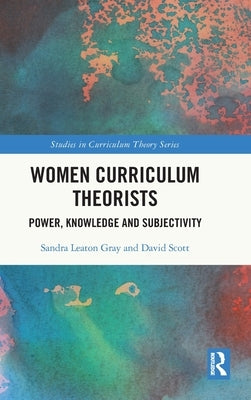Before you leave...
Take 20% off your first order
20% off
Enter the code below at checkout to get 20% off your first order
Discover summer reading lists for all ages & interests!
Find Your Next Read

Most published bodies of work relating to curriculum theory focus exclusively, or almost exclusively, on the contributions of men. This is not representative of influences on educational practices as a whole, and it is certainly not representative of educational theory generally, as women have played a significant role in framing the theory and practice of education in the past. Their contribution is at least equal to that of men, even though it may not immediately appear as visible on library shelves or lecture lists. This book addresses this egregious deficit by asking readers to engage in an intellectual conversation about the nature of women's curriculum theory, as well as its impact on society and thought in general. It does this by examining the work of twelve women curriculum theorists: Maxine Greene, Susan Haack, Julia Kristeva, Martha Nussbaum, Nel Noddings, Jane Roland Martin, Marie Battiste, Dorothea Beale, Susan Isaacs, Maria Montessori, Mary Warnock and Lucy Diggs Slowe.
The book is not an encyclopaedia, nor is it a history book. It aims to bring to the reader's attention, through a semantic rendition of the world, those seminal relationships that exist between the three meta-concepts that are addressed in the work, feminism, learning and curriculum. It will appeal to scholars and researchers with interests in curriculum, and the philosophy and sociology of education.
Sandra Leaton Gray is an Associate Professor of Education at the UCL Institute of Education, UK, and Senior Member, Wolfson College, Cambridge University.
David Scott is an Emeritus Professor of Curriculum, Pedagogy and Assessment at the UCL Institute of Education, UK.
Thanks for subscribing!
This email has been registered!
Take 20% off your first order
Enter the code below at checkout to get 20% off your first order